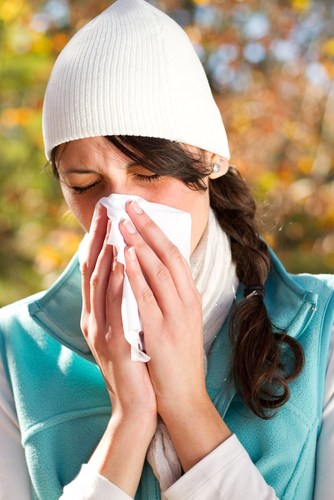Dr. Margit Lister says some natural cold remedies work better than others. She rates five popular remedies.
Treating Colds the Natural Way
It is estimated that Americans catch a cold about 1 billion times in a year. It is the number one reason for doctor visits and missing work or school. The important thing to remember about the common cold is that it is a virus and will not respond to antibiotic treatment. So how do you kill a virus and alleviate your cold? Unfortunately, you have to rely on your natural immune system to keep you healthy and fight the cold. The best way to kill a virus is to boast your immune system. Your immune system is in your blood/skin and protects you from viruses. Several things (stress, poor diet, obesity, lack of exercise or sleep) decrease the ability for your immune system to fight off viral infections. So help your immune system be stronger by getting regular exercise, adequate sleep at night, eating a low fat and low sugar diet and learning to relax/meditate. When it comes to fighting colds, the old adage is true “an ounce of prevention is worth a pound of cure’.
Colds are usually spread from touching a virus contaminated surface and then infecting yourself by touching your face, putting food in your mouth with your fingers or rubbing your eyes. Colds can also be spread by inhaling viral infected droplets from a cough or sneeze of someone with a cold. It takes about 3 days for the cold to develop and your cold usually lasts about a week with a normal functioning immune system. So how can you stop your cold?
The short answer is you really can’t ‘STOP’ a cold. But you can boast your immune system with some alternative medicines that may shorten the length of your cold. Let’s look at some of the common things people try to treat their cold and what evidence there is to support their use.
Echinacea
Echinacea is a common herbal supplement that is used to treat the common cold. There are several problems with Echinacea. First, what part of the plant is most effective for treating the cold? The root? The seed? The leaves? The flower? Which species of plant is most effective? How much of the plant to you need to eat? How do you prepare it? In 2002, the Annuals of internal Medicine published a study using capsules of the whole plant of Echinacea given to college students with the common cold and showed no benefit over placebo for reducing the symptoms of the common cold. The criticism of this study is the dose was wrong but there is no repeat study with a different dose to really understand what is needed to stop a cold. So the short answer is; The scientific evidence does not support using Echinacea for the common cold.
Vitamin C
This is a common treatment for a cold and the evidence supports that it does seem to shorten the length of your cold and its severity. You need to take at least 200 mg a day. The exact dose and timing is still under debate, but the short answer is that vitamin C at a dose of at least 200 mg daily may decrease the length and the intensity of your cold.
Zinc
Zinc is used in many products as a natural treatment for the common cold. The important thing to remember about zinc is NOT TO PUT IT IN YOUR NOSE! Zinc, when taken intranasally, has been linked to nosmia or loss of smell. The most effective way to decrease the length of your cold with zinc is with zinc lozenges that contain at least 70 mg per day.
What else?
Neti pots
A Neti pot is sometimes used in the treatment of sinus congestion caused from a cold. Research does show that using a Neti pot or other forms of nasal irrigation can temporarily alleviate congestion and sinus pressure/pain. The Neti pot works by thinning the mucus that collects in the sinuses and helps flush the mucus and infection from your sinuses. This is one of the first rules that you learn in surgery as a medical student. “The solution to pollution is dilution.” If you have an infection, anytime you can dilute the numbers of pollutants, the faster your immune system works to fight the problem.
To use a Neti pot, make a solution of 1 pint of warm water with 1 teaspoon of salt and fill the Neti pot with the solution. Put your head over the sink at a 45 degree angle and let the solution fill one nostril and drain out the other. Blow your nose and repeat the process on the other side.
Ensure that you wash your hands after you blow your nose and wash the pot and throw away any remaining liquid.
Chicken Soup
May have some benefit to sooth your throat and hydrate you, but there has not been any scientific study to prove a benefit over other warm liquids. I would put chicken noodle soup in the category of probably won’t hurt and may help.
Airborne
A lot of the nurses I work with asked me to look up Airborne and see if there is any evidence that this product really works. Airborne comes in tablets and a to-go drink. Each packet includes Vitamin B2, A, C, E, Zinc, a proprietary herbal blend that includes Echinacea and some trace minerals. They did not have the doses of each element on their website.
The short answer is no one will ever know if this really works unless Airborne does a placebo controlled study to find out the answer. But what happens if the study shows that it is no better than placebo? Then your company goes away, so this will never happen. And since this is an herbal supplement, they don’t have to prove its benefit. So long story short, if the product is about $6.99 for a tube of airborne and there is 100% refund if you are dissatisfied ( assuming you kept your proof of purchase and store receipt) if may be worth a try.
You could also do your own research. The placebo affect means that 4 out of 10 people will show benefit from a product when there is none. So get 10 of your friends, and one with a cold. Have the friend with a cold, sneeze on nine of your other friends and you, and if 5 people have a reduction in cold symptoms using airborne, I think it works. But I will pass on being a participant in the research!
Dr. Margit Lister is an OBGYN with Intermountain Health Care. If you would like to schedule an appointment, visit: www.intermountainclinics.org.















Add comment